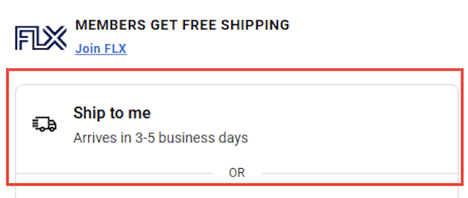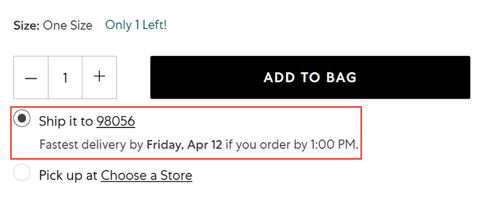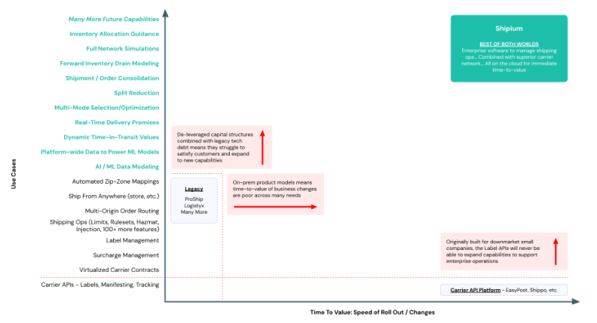Make Prime-Like Delivery Promise Part of Your Strategy

As a retailer, it’s probably no secret to you that online shopping is a cornerstone of your digital customer experience strategy. In fact, you’ve probably already invested significant time and money to improve your brand’s shopping experience (streamlined website, personalized offers and product recommendations etc.)
However, like most retailers or brands, you’re likely also facing a broader problem — customers’ expectations for the shipping experience have evolved much faster than your technology and strategy.
Innovative companies like Amazon have made transparent, fast, and low-cost shipping the new industry standard, which presents a threat if you if you can't provide a competitive customer experience.
It’s also an opportunity. With the right technology, you can align your shopping experience with shipping operations to offer a Prime-like checkout experience and boost conversion rates. In this article, we’ll explain how.
Understanding the “Prime Problem”
You’ve likely known for years that Amazon’s fast, low-cost shipping experience has set a new standard for the checkout experience. Whether by observing other brands or through your own experiences as a shopper, you know that there’s a distinct difference between this…

...and this:

The 2nd screenshot is an example of a Delivery Promise, which is the exact type of data-backed commitment that helped Amazon’s Prime business explode (trust us — our co-founder helped build it). Rather than being told that their order will arrive at an indeterminable time in the near future, customers are guaranteed that it will arrive within days (at an affordable rate).
While the former has been the standard for years, customers now expect the latter — which means it's time to evolve your digital customer experience strategy, if you haven't already.
Expectations → Opportunity
The data backs this up. Depending on the source, it’s estimated that offering a true delivery promise — as opposed to just a delivery estimate — can increase checkout conversion rates from 6-10%. Even on the conservative end, if you’re doing millions of annual orders, this represents a significant increase in revenue.
Amazon isn’t the only company doing this today. Having recognized that shipping is the 2nd most effective growth driver (behind price), many technologically advanced retailers are following suit (the example in the previous section is from Shipium customer Saks OFF 5TH).
Point being: with the right shipping technology, you too can turn the “Prime Problem” into a major growth opportunity.
Recognizing the limitations of your current technology
Unfortunately, implementing the “right” technology is much easier said than done. On both the customer experience and logistics sides, existing solutions usually aren’t comprehensive enough to power a true delivery promise. In some cases, companies may even be prioritizing the conversion benefits of a delivery promise at the expense of their margins.
To offer a data-backed delivery promise that won’t upend your logistics operations, you need both of the following:
- Inventory awareness: This is self-evident, but to make a commitment to deliver certain items to a customer in a specific location, you need to know the closest place you have those items in stock (warehouse, store etc.) This provides you with the origin and destination you need to estimate transit performance.
- Carrier performance and transit insight: The other half of the equation is being able to accurately predict transit performance based on more than just carrier estimates. To do this, your technology needs to analyze historical carrier performance data as well as macro-conditional data (fuel prices, weather changes etc). It’s also worth mentioning that you need to be able to trust the underlying machine learning models that are making predictions, so having at least some understanding of their performance is a must (ex. % of successful on-time deliveries predicted).
Your system of record for inventory that links it to commerce operations, such as Manhattan Active Omni, will know the status of your inventory and solve that half of providing a promise you can keep.
If you’ve been looking for a technology solution that can give you the transportation insight that helps you offer a delivery promise, you’ve likely come across one or more of the following types of vendors.
Post-order experience platforms, who predict delivery dates by performing machine learning on tracking data, can provide you with a stronger understanding of transit performance and help you offer more accurate EDDs. The problem is, these platforms don’t meet the criteria for inventory awareness given that they don’t have visibility into inventory distribution — so while in theory, you should be able to commit to a delivery date, you can’t actually do so with confidence.
Conversely, ERP and Warehouse Management Systems also offer solutions for delivery promise. Again, while these are robust solutions that can absolutely help you boost ORD, they are also 100% inventory-based, with little to no transit insight associated. While these platforms have visibility into inventory allocation in real time across nodes and can predict the likely origin of the order, they still need to rely on static dates provided by carriers (ex. From this origin, FedEx and UPS offer 2 and 5 day options, so those are the EDDs).
To give a truly Amazon quality delivery promise, you need a solution that factors in all available data, and can perform at the massive scale your operations require.
A note on your ops team’s shipping technology

It’s important to note that limitations with shipping technology are nearly ubiquitous among enterprise retailers, who set up their systems at a time when on-premise systems dominated the market. On top of the scalability and administration headaches that come with this, traditional end-to-end shipping platforms haven’t evolved much, and it’s unlikely that they’re advanced enough to provide trustworthy predictions.
We should also mention that limited alternatives exist — cloud-based, API-first products can help to scale shipping operations more easily, but they don’t cover the same number of use cases as more robust platforms, which make them limiting.
How Shipium can help
Shipium is the only platform that’s purpose-built to give you the full picture as it relates to delivery promises — it’s also the only platform that’s been brought to market directly by the folks who helped make Prime a success. The platform’s API-first approach makes it painless to integrate your PDP and checkout pages (as well as logistics tools like your OMS, WMS etc.) with a single platform to manage shipping operations.
When it comes to inventory awareness, Shipium’s integration with your OMS and WMS systems provides full visibility into every node in your network — which enables the platform to both confirm product availability and easily determine the best origin for a given order.
Carrier performance insight and transit optimization are both key elements of the platform. First, we pre-integrate with carriers who service 99.2% of parcel shipments in the domestic U.S., and carefully monitor performance to gain an accurate understanding of what they’re capable of. Then, our proprietary machine learning models (100+ tested in 2023) analyze carrier performance data, macro-conditions, and inventory availability to provide a Dynamic Time-in-Transit estimate that forms the basis for your delivery promise.
Rather than foregoing delivery promises or basing them on incomplete data in a way that strains shipping operations, Shipium helps you make a promise that you can keep and keep the promise that you make.
Wrapping up
The shipping experience is half the shopping experience. You need a modern shipping system to align with your digital customer experience strategy and help power the shopping experience customers demand.
If optimizing the online shopping experience is a priority, you can reach out to our team here.

Anurag leads Shipium’s product marketing efforts, focused on helping the world understand how our platform adds incredible value for everyone.


